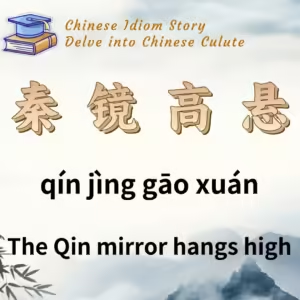
Chinese Idiom: 秦镜高悬 (Qin Jing Gao Xuan)
English Translation: The Qin mirror hangs high
pīn yīn: qín jìng gāo xuán
Idiom Meaning: This idiom refers to the ability to discern right from wrong and to administer justice impartially. It is also known as “明镜高悬” (ming jing gao xuan).
Historical Source: Xi Jing Za Ji (《西京杂记》) by Liu Xin of the Han Dynasty.
Idiom Story:
The idiom “秦镜高悬” originates from a legendary tale about a miraculous square mirror housed in the palace of Xianyang during the Qin Dynasty. This remarkable mirror measured four feet wide and five feet nine inches tall, with both sides exceptionally bright.
When a person stood in front of the mirror, their reflection appeared inverted. However, if someone placed their hand on their chest while looking into it, the mirror could clearly reflect their internal organs. It was said that individuals suffering from ailments could identify the source of their illness through the mirror’s revealing power. Furthermore, if someone harbored malicious intentions, those ill motives would also be clearly visible upon inspection.
According to the legend, Qin Shi Huang, the first emperor of China, frequently used this mirror to evaluate the loyalty of the palace concubines and guards. If he noticed anyone exhibiting signs of anxiety or deceit, they would be immediately arrested for interrogation and punishment.
The tale takes a turn during the conflict between Liu Bang and Xiang Yu, who both invaded Xianyang. Liu Bang, upon entering the palace, secured the treasures inside, including the famed mirror. However, when Xiang Yu and his forces later arrived, he seized many of the treasures from Liu Bang, and the fate of the miraculous mirror became uncertain.
The story of the extraordinary mirror gave rise to the idiom “秦镜高悬,” symbolizing the vigilance and clarity required for impartial judgment and the ability to see through deceit. This idiom now represents a commitment to justice and moral integrity, emphasizing the importance of discernment in leadership and governance.






